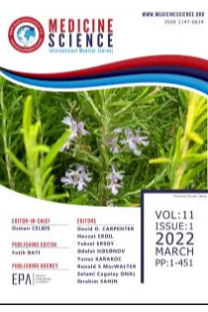Psychological resilience and health perception among adolescents and related factors
___
1. Coleman J, Hagell A, eds, Adolescence, risk and resilience: Against the odds. John Wiley & Sons; 2007.2. Benard B. Fostering resiliency in kids: Protective factors in the family, school, and community. Institute of Education Sciences (ERIC), US; 1991;1-32.
3. Bonanno GA. Loss, trauma, and human resilience: have we underestimated the human capacity to thrive after extremely aversive events? Am Psychol. 2004;59(1):20-8.
4. Poole JC, Dobson KS, Pusch D. Childhood adversity and adult depression: the protective role of psychological resilience. Child Abuse Negl. 2017;64:89-100.
5. Ye Z, Chen L, Harrison SE, Guo H, Li X, Lin D. Peer victimization and depressive symptoms among rural-to-urban migrant children in China: The Protective Role of Resilience. Front Psychol. 2016;7:1542.
6. Linquanti R. Using community-wide collaboration to foster resiliency in kids: a conceptual framework. Institute of Education Sciences (ERIC), US; 1992.
7. Masten A, Obradović J. Disaster preparation and recovery: Lessons from research on resilience in human development. Ecology and Society. 2008;13(1):9.
8. Garmezy NE, Rutter ME. Stress, coping, and development in children. In Seminar on Stress and Coping in Children, 1979, Ctr for Advanced Study in the Behavioral Sciences, Stanford, CA, US 1983. Johns Hopkins University Press.
9. Bulut S, Doğan U, Altundağ Y. Adolescent psychological resilience scale: validity and reliability Study. Suvremena Psihologija. 2013;16(1):21-32.
10. Mandleco BL. An organizational framework for conceptualizing resilience in children. Journal of J Child Adolesc Psychiatr Nurs. 2000;13(3):99-112.
11. Werner EE. Protective factors and individual resilience. Handbook of Early Childhood Intervention. 2000;2:115-32.
12. Garmezy N. Stress, competence, and development: Continuities in the study of schizophrenic adults, children vulnerable to psychopathology, and the search for stress-resistant children. American Journal of Orthopsychiatry. 1987;57(2):159-74.
13. Önder, A, Gülay, H. İlköğretim 8. sınıf öğrencilerinin psikolojik sağlamlığının çeşitli değişkenler açısından incelenmesi. Dokuz Eylül Üniversitesi Buca Eğitim Fakültesi Dergisi, 2008;23:192-7.
14. Güngörmüş K, Okanlı A, Kocabeyoğlu T. Hemşirelik öğrencilerinin psikolojik dayanıklılıkları ve etkileyen faktörler (‘The Psychological Resilience of Nursing Students and Related Factors’). Psikiyatri Hemşireliği Dergisi. 2015;6(1):9-14.
15. Wang J. A study of resiliency characteristics in the adjustment of international graduate students at American universities. Journal of Studies in International Education. 2009;13(1):22-45.
16. Diener E, Chan MY. Happy people live longer: Subjective wellbeing contributes to health and longevity. Applied Psychology: Health and WellBeing. 2011;3(1):1-43.
17. Pressman SD, Cohen S. Does positive affect influence health?. Psychological Bulletin. 2005;131(6):925-71.
18. World Health Organization, “Constitution of WHO: principles” http://www.who.int/about/mission/, Last accessed date: 16-February2017.
19. Weissberg RP, Kumpfer KL, Seligman ME. Prevention that works for children and youth: An introduction. American Psychological Association; 2003.
20. UNICEF. Child well-being in rich countries: a comparative overview. UNICEF Office of Research-Innocenti; 2013.
21. Mak WW, Ng IS, Wong CC. Resilience: enhancing well-being through the positive cognitive triad. J Couns Psychol. 2011;58(4):610-7.
- ISSN: 2147-0634
- Yayın Aralığı: Yılda 4 Sayı
- Başlangıç: 2012
- Yayıncı: Effect Publishing Agency ( EPA )
Okan ASLANTÜRK, Emre ERGEN, Metehan ÖZEN, Kadir ERTEM
Apple peel atresia: a rare case of a small premature infant
Evaluation of fundus findings in preeclampsia
ERDEM DİNÇ, Mustafa VATANSEVER, Özer DURSUN, Fatma Merve BOZKURT, Ayşe Ayça SARI, Ayça YILMAZ, Ufuk ADIGÜZEL, Özlem YILDIRIM, Mehmet Atila ARGİN
Psychological resilience and health perception among adolescents and related factors
HAKAN GÜRBÜZ, Süleyman Semih DEDEOĞLU, Yunus İMREN, Ali Çağrı TEKİN, Mustafa Çağlar KIR, Yasin GULER
Risk factors for mortality in delayed intertrochanteric fractures
Haluk ÇABUK, Cem Dinçay BÜYÜKKURT, Ali Çağrı TEKİN, Süleyman Semih DEDEOĞLU, Yunus İMREN, Yasin GULER, HAKAN GÜRBÜZ
Maternal satisfaction regarding perinatal care and ınfluencing factors in tertiary
Sadiksha REGMİ, Hari Prasad KAPHLE, Neena GUPTA
Successful management of zinc phosphide poisoning: possible benefit of virgin olive oil
Distal symmetrical polyneuropathy due to organophosphate intoxication
Semih ALAY, MEHMET GÜNEY ŞENOL, Tansel KENDİRLİ, RİFAT ERDEM TOĞROL, Mehmet SARAÇOĞLU
